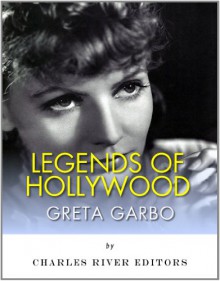*Includes pictures. *Includes a bibliography for further reading. *Includes a table of contents. “Her instinct, her mastery over the machine, was pure witchcraft. I cannot analyze this woman's acting. I only know that no one else so effectively worked in front of a camera.” – Bette Davis Of all...
show more
*Includes pictures.
*Includes a bibliography for further reading.
*Includes a table of contents.
“Her instinct, her mastery over the machine, was pure witchcraft. I cannot analyze this woman's acting. I only know that no one else so effectively worked in front of a camera.” – Bette Davis
Of all the great movie stars, there may be none more enigmatic than Greta Garbo, who remains internationally famous despite the fact her life and career raise more questions than answers. How did a Swedish actress with very little film acting experience in her native land arrive in the United States and achieve instant stardom? Most actresses had to wait years before they were offered starring roles in major films, yet Garbo was ushered to the front of the line and perched atop the MGM pantheon at a time in which it was the studio par excellence. How was she able to transition from silent films to “talkies” so fluidly, giving many of her most decorated performances during the 1930s? While stars like Charlie Chaplin never recovered from cinema’s transition to synchronized sound, Garbo flourished, which is made all the more amazing by the fact she had a foreign accent that could easily have alienated American audiences and threatened her career. Finally, and perhaps most mystifying of all, why would Garbo retire in 1941, at just 36 years of age and two years removed from Ninotchka, arguably her most acclaimed film?
As unique as Greta Garbo and her career were, there is no denying the impact that she had on audiences, both critics and working-class viewers. Not only was she the most lucrative star in the country by 1928, she also provoked awe from some of the most venerable film and cultural theorists, who attempted to articulate exactly what it was about her that proved so arresting (Swenson). Writing about her in a famous essay devoted to her face, Roland Barthes asserted, “Garbo still belongs to that moment in cinema when capturing the human face still plunged audiences into the deepest ecstasy, when one literally lose oneself in a human image as one would in a philtre, when the face represented a kind of absolute state of the flesh, which could be neither reached nor renounced. A few years earlier the face of Valentino was causing suicides; that of Garbo still partakes of the same rule of Courtly Love, where the flesh gives rise to mystical feelings of perdition.” Barthes’ description hints at how Garbo’s face was the primary attraction of her films, to the point that she achieved a spellbinding influence that made her one of the true goddesses of film history.
At the same time, for as famous as Greta Garbo is as an actress, her films are not remembered so positively, if they are remembered at all. While Garbo herself was nominated on three occasions for the Academy Award for Best Actress, only one film of hers, Grand Hotel (1932), was even nominated for an Academy Award for Best Picture. For the most part, Garbo acted in films that were seemingly well beneath her, which was certainly the case with her films from the silent era. During the late 1920s, for example, she was routinely paired with leading man John Gilbert, yet out of the films they appeared in together — Flesh and the Devil (1926), Love (1927), A Woman of Affairs (1928), and Queen Christina (1933) — only the latter is well-remembered today. Even the first film for which she was nominated for an Oscar, Romance (1930), is commemorated only by Garbo’s most fervent admirers. Ironically enough, it was just as Garbo neared the end of her career that she was just beginning to star in more critically revered films, movies such as Anna Karenina (1935), Camille (1936), and most of all, Ninotchka (1939).
Legends of Hollywood: The Life and Legacy of Greta Garbo explores the life and career of Greta Garbo, analyzing her fame and how a notably shy young girl rose to the top of Hollywood.
show less

